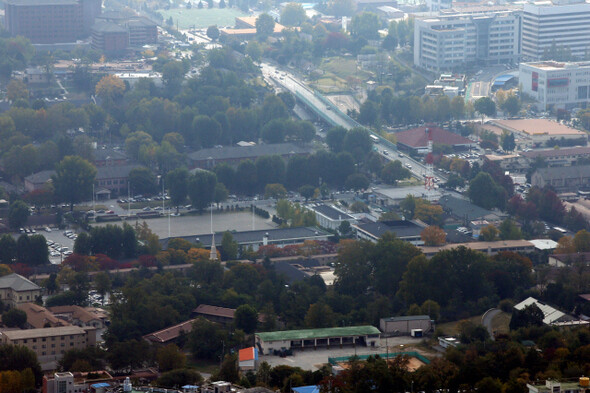hankyoreh
Links to other country sites 다른 나라 사이트 링크
[Editorial] “Regional security environment” is a problematic reason to delay OPCON transfer

As has already been pointed out, there are numerous problems with the agreement between the US and South Korea to once again delay the transfer of wartime operational control (OPCON) of the ROK military. At the same time, one of the conditions that the two countries placed on OPCON transfer - the regional security environment - is raising other questions.
According to the joint communique from this year’s ROK-US Security Consultative Meeting, OPCON will be transferred to Korea when “the security environment on the Korean Peninsula and in the region is conducive to a stable OPCON transition.” The phrase “security environment [. . .] in the region” is bound to attract attention, since this is the first time it has been mentioned in regard to the OPCON transfer.
The phrase “regional security environment” is very problematic, since it could be interpreted as referring to conflict with China and other countries in the region. At the moment, China is engaged in a territorial dispute with Japan over the Senkaku Islands (called Diaoyu in China), and it is butting heads with countries in Southeast Asia over the Spratly Islands (called Nansha in China).
Since disagreements between China and its neighbors have no direct bearing on the Korean peninsula, there is no reason for this to be mentioned as a condition for OPCON transfer. The country that has something to gain from such a requirement is the US, which hopes to take advantage of these conflicts to counter Chinese influence. This is why specifying the regional security environment as a condition for OPCON transfer is unacceptable.
When asked why the regional security environment was invoked in regard to the OPCON transfer, a South Korean Ministry of National Defense official said, “If connecting routes in the South China Sea or East China Sea get caught up in an armed conflict, that would pose a serious threat.” But we cannot shake the feeling that this explanation is lacking.
Even more worrisome is the possibility that this reference to the regional security environment could be intended to lay the groundwork for deploying THAAD (Terminal High Altitude Air Defense) in South Korea, a possibility that China is carefully watching.
During the Security Consultative Meeting, US Defense Secretary Chuck Hagel said that the US and South Korea had not discussed the question of deploying THAAD on the Korean peninsula. But this does not assuage suspicions that making regional security environment a condition for OPCON transfer is an attempt to create a pretext for bringing THAAD and other parts of the US missile defense system into South Korea.
If we get mixed up in the conflict between the US and China, South Korea’s national interest is likely to be jeopardized, since South Korea has come to regard China as its number one economic partner.
Ultimately, while this delay of the OPCON transfer was ostensibly requested by South Korea and accepted by the US, the details of the agreement suggest that the South Korean government risked harming its relations with China in order to provide the US with what it needs to execute its strategy for Northeast Asia. This abdication of military sovereignty will only cause further harm to the national interest - and, sadly, the South Korean government cannot even offer a decent explanation for its actions.
Please direct questions or comments to [english@hani.co.kr]

Editorial・opinion
![[Column] Has Korea, too, crossed the Rubicon on China? [Column] Has Korea, too, crossed the Rubicon on China?](https://flexible.img.hani.co.kr/flexible/normal/500/300/imgdb/original/2024/0419/9317135153409185.jpg) [Column] Has Korea, too, crossed the Rubicon on China?
[Column] Has Korea, too, crossed the Rubicon on China?![[Correspondent’s column] In Japan’s alliance with US, echoes of its past alliances with UK [Correspondent’s column] In Japan’s alliance with US, echoes of its past alliances with UK](https://flexible.img.hani.co.kr/flexible/normal/500/300/imgdb/original/2024/0419/2317135166563519.jpg) [Correspondent’s column] In Japan’s alliance with US, echoes of its past alliances with UK
[Correspondent’s column] In Japan’s alliance with US, echoes of its past alliances with UK- [Editorial] Does Yoon think the Korean public is wrong?
- [Editorial] As it bolsters its alliance with US, Japan must be accountable for past
- [Guest essay] Amending the Constitution is Yoon’s key to leaving office in public’s good graces
- [Editorial] 10 years on, lessons of Sewol tragedy must never be forgotten
- [Column] A death blow to Korea’s prosecutor politics
- [Correspondent’s column] The US and the end of Japanese pacifism
- [Guest essay] How Korea turned its trainee doctors into monsters
- [Guest essay] As someone who helped forge Seoul-Moscow ties, their status today troubles me
Most viewed articles
- 1[Column] The clock is ticking for Korea’s first lady
- 2Samsung barricades office as unionized workers strike for better conditions
- 3S. Korea, Japan reaffirm commitment to strengthening trilateral ties with US
- 4[News analysis] After elections, prosecutorial reform will likely make legislative agenda
- 5[Editorial] When the choice is kids or career, Korea will never overcome birth rate woes
- 6Japan officially says compensation of Korean forced laborers isn’t its responsibility
- 7[Editorial] As it bolsters its alliance with US, Japan must be accountable for past
- 8Why Israel isn’t hitting Iran with immediate retaliation
- 9[Column] Has Korea, too, crossed the Rubicon on China?
- 10All eyes on Xiaomi after it pulls off EV that Apple couldn’t